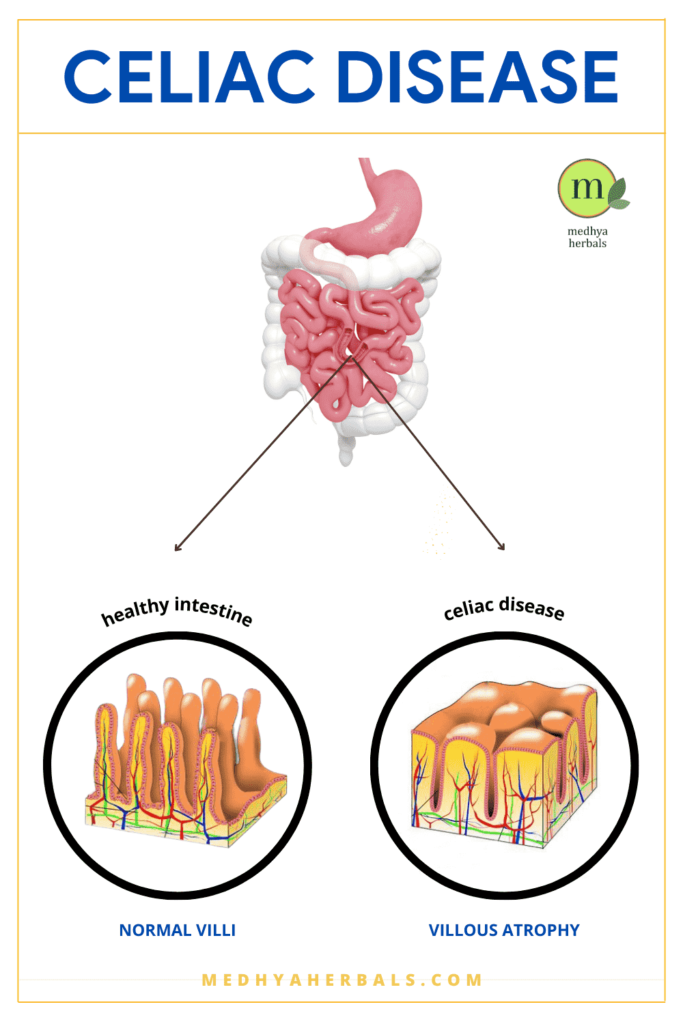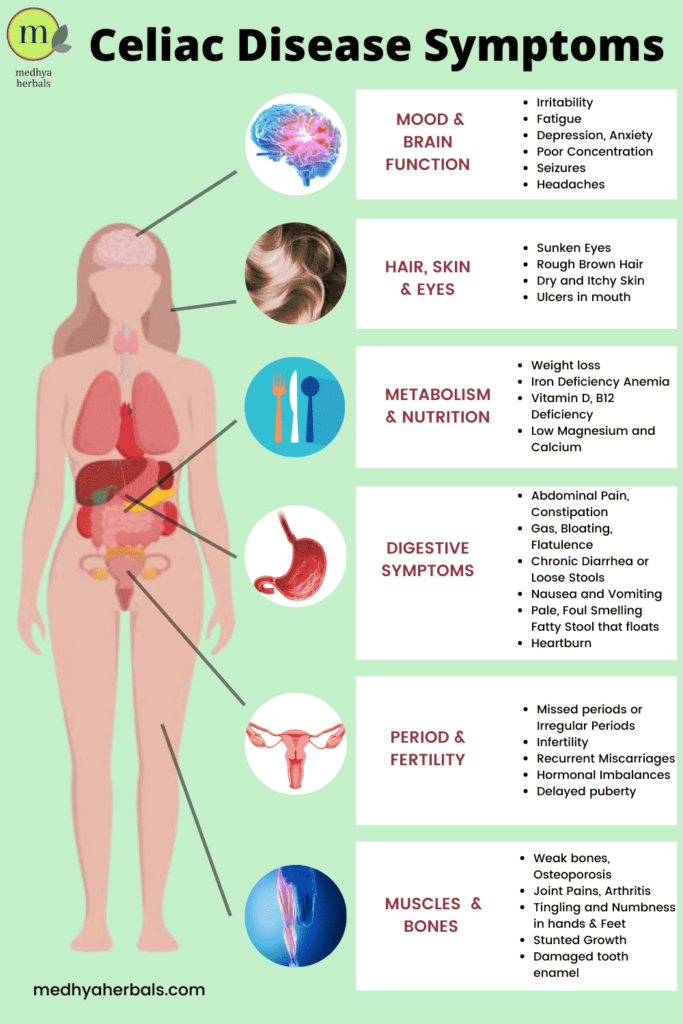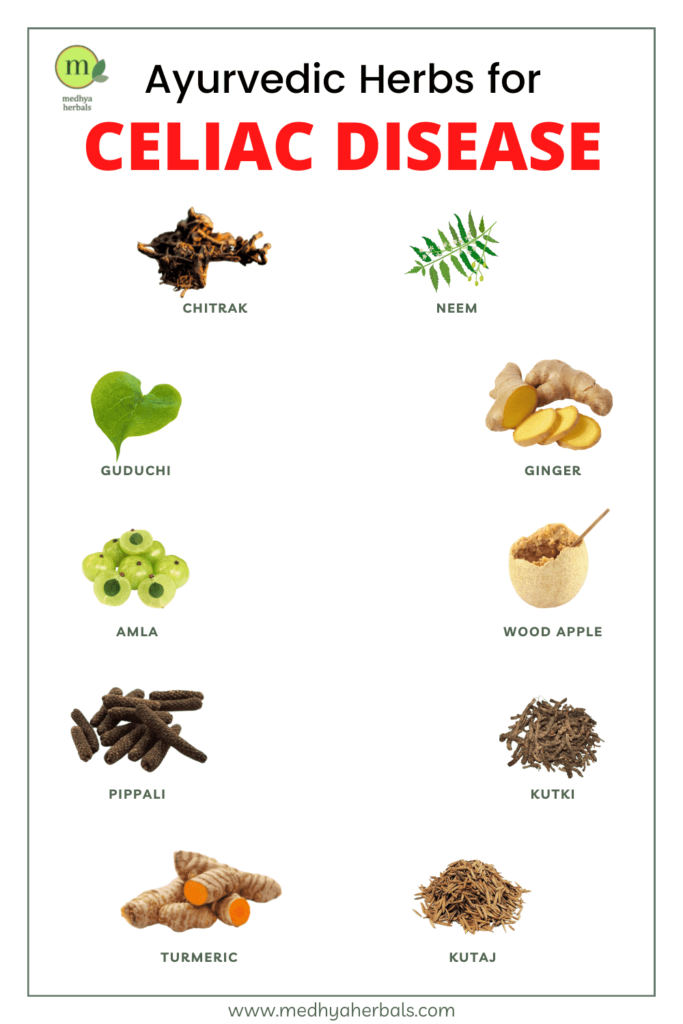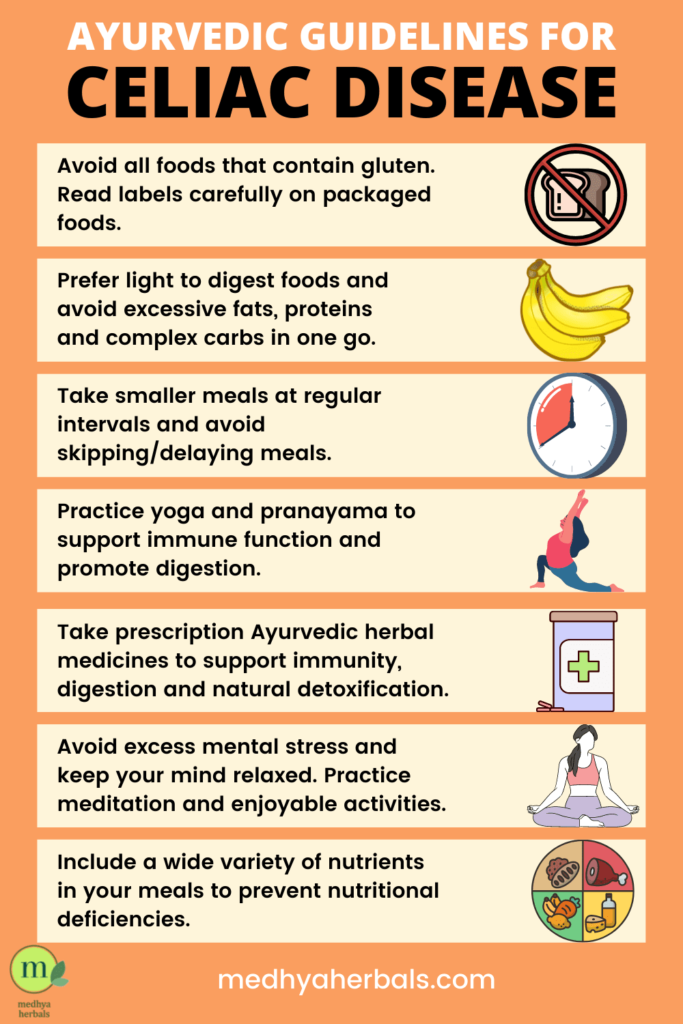In today’s health-conscious world, terms like “gluten intolerance” and “autoimmune condition” are becoming increasingly familiar. But beneath these terms lies a more intricate and often misunderstood condition known as celiac disease. Affecting approximately 1 in 100 people globally, celiac disease is more than just a mere digestive disorder; it’s an autoimmune condition where the ingestion of gluten leads to damage in the small intestine. Many often confuse it with a simple gluten allergy, but its implications are far more profound.
From unexplained weight loss, fatigue, and anemia to more severe digestive disorders, the symptoms of gluten intolerance vary widely and can often be mistaken for other conditions. This makes early detection and understanding crucial for those affected. And while modern medicine offers some solutions, many are now turning towards ancient remedies, such as ayurvedic treatment for celiac disease, to find holistic and natural solutions.
If you’ve ever wondered about the intricacies of celiac disease, its symptoms, or how Ayurveda might offer a fresh perspective on treatment, you’re in the right place. This article promises to shed light on these questions and more, providing valuable insights for those seeking a balanced and informed approach to managing and possibly overcoming this autoimmune disease.
What is Celiac Disease?
Celiac disease is a chronic autoimmune disorder that affects the small intestine. In celiac disease, a person’s digestive system becomes extremely sensitive to foods that contain gluten. It is also known as celiac sprue, gluten sensitivity, wheat intolerance or gluten-sensitive enteropathy.
Celiac disase is caused by an abnormal immune response to gluten, a protein found in wheat, barley, and rye. It gives the elasticity to dough.

What happens when a Coeliac Disease patient eats gluten?
When individuals with celiac disease consume gluten, their immune system responds by attacking the lining of the small intestine, causing inflammation and damage to the villi, which are small finger-like projections that line the intestine and absorb nutrients.
In the initial stages, a person may or may not have any symptoms of celiac disease or the symptoms maybe limited to digestive discomforts. However, over time this damage can lead to malabsorption of nutrients and a variety of health problems, including malnutrition, anemia, osteoporosis, and other autoimmune disorders.
Celiac disease often becomes a lifelong condition that can be managed with a strict gluten free diet. This diet requires avoiding all foods that contain gluten. There are many gluten free foods that can help you manage celiac disease and prevent flare up of celiac disease symptoms.
Difference Between Gluten Intolerance, Gluten Allergy, and Celiac Disease
- Gluten Intolerance: This is a broad term that encompasses various conditions where individuals experience discomfort after consuming gluten, but without the autoimmune response seen in celiac disease. It does not lead to long-term damage to the intestine.
- Gluten Allergy (Wheat Allergy): An allergy to wheat involves the body producing an allergic response to proteins in wheat, not just gluten. Symptoms might include itching, swelling, or difficulty breathing, similar to other allergic reactions.
- Celiac Disease: As previously mentioned, this is an autoimmune condition where the ingestion of gluten leads to damage in the small intestine. It’s the most severe form of gluten sensitivity and requires strict lifelong adherence to a gluten-free diet.
What Causes Celiac Disease?
In Celiac disease, the white blood cells of the immune system attack and damage the intestinal villi upon gluten consumption. Over the time, this continuous attack changes the structure of small intestinal villi and leads to permanent intestinal damage.
Since, intestinal villi are responsible for fending off harmful bacteria as well as for digestion of the nutrients from the food; both immune system and digestion are impaired in celiac disease.
The exact mechanism of how Coeliac Disease occurs is not fully understood. However, it is thought to be caused by a combination of genetic and environmental factors. Some researchers believe that Celiac Disease is triggered by an infection or other environmental factor in people who are genetically predisposed to the condition.
Celiac disease is diagnosed with a blood test and a biopsy of the small intestine. The blood test looks for antibodies that are produced when the body reacts to gluten. The biopsy is used to confirm the diagnosis.
Risk Factors of Celiac Disease
Celiac disease is more common in young kids. It can also go undetected for long till a person reaches adulthood.
- Family history of celiac disease or dermatitis herpetiformis
- Type 1 Diabetes Mellitus
- Down syndrome
- Turner syndrome
- Addison’s disease
- Lymphocytic or collagenous colitis
- Hashimoto’s Thyroiditis (Autoimmune Thyroid Disorder)
Celiac Disease Symptoms
The symptoms of Celiac Disease can vary from person to person. Some people with Celiac Disease may not have any symptoms at all. Others may experience a wide range of symptoms as listed below.

In addition, the symptoms of celiac disease vary in adults and kids. Children usually show digestion problems, pain, delayed puberty and stunted growth
Digestive Symptoms
- Abdominal Pain, Constipation
- Gas, Bloating, Flatulence
- Chronic Diarrhea or Loose Stools
- Nausea and Vomiting
- Pale, Foul Smelling Fatty Stool that floats
- Heartburn, Ulcers in mouth
Symptoms of Nutritional Deficiency
- Rough Brown Hair, Dry and Itchy Skin
- Irritability, Fatigue
- Depression, Anxiety
- Seizures, Headaches
- Weak bones, Bone loss and Osteoporosis
- Joint Pains, Arthritis
- Tingling and Numbness in hands & Feet
- Weight loss
- Iron Deficiency Anemia
- Vitamin D, B12 Deficiency
Health Complications of Celiac Disease
Celiac disease is a serious condition that can lead to malnutrition, as the body cannot absorb nutrients from food properly. In children, this disease can lead to stunted growth and short stature as an adults.
Nutritional deficiency due to malabsorption in Celiac Disease can also lead to a number of health complications, such as:
- Low iron symptoms, Iron deficiency anemia
- Bone loss, frequent fractures and Osteoporosis
- Fertility problems in women such as miscarriages, difficulty in conceiving, infertility
- Liver damage and kidney diseases
- Nervous system problems related to seizures, Schizophrenia, ADHD and memory problems
- Autoimmune disorders
- Food allergies and sensitivity to multiple foods such as dairy, nuts and oxalates
- Malignant growths and development of intestinal or pancreatic cancer
Ayurvedic Perspective of Celiac disease
Celiac disease is classified as “Grahani Roga” in Ayurveda. Grahani refers to the function of the intestines, where the digestive fire resides and Roga refers to disease. Grahani falls in the category of 8 major diseases, which are difficult to diagnose and treat.
According to Ayurveda, grahani roga of celiac disease originate in digestive fire dysfunction, which leads to build up of toxins “Ama” in the digestive tract. “Ama” is a thick and gooey substance that interferes with normal functioning of the digestive tract, such as it can affect the secretion of digestive juices, damage the integrity of the gut lining and also hamper the peristalsis movement of the intestines.
In addition, “ama” blocks the flow of dosha and triggers autoimmune response in the digestive tract. This makes the patient highly sensitive to even normal food items, which now start acting as allergens for them. In case of celiac disease, “ama” increases gluten sensitivity, thus leading to gluten intolerance and serious allergic reactions to gluten containing foods.
Celiac disease Treatment with Ayurveda
The goal of Ayurvedic treatment is to restore the balance of the digestive fire (agni). Detoxification of the body also aids in the removal of ama from the digestive tract. In addition, Ayurvedic herbals medicines are used to restore the villi of the intestines and balance the immune system.
When people with celiac disease begin Ayurvedic treatment, they must follow a strict gluten free diet. Eventually with intestinal healing you may be able to take foods with gluten.
Steps involved in Ayurvedic Treatment for Celiac Disease:
- Detoxification to remove intestinal inflammation
- Balancing the digestive fire
- Healing the intestinal lining
- Supporting normal immune response
- Rejuvenation and strength building through balanced nutrition
Ayurvedic Herbal Medicines for Celiac Disease Treatment
There are multiple herbs in Ayurvedic medicine that can help to normalize the digestive fire and flush the toxins out of the digestive tract. These medicines fall in the category of “Agni Deepana” and “Aam Pachana” herbs.
In addition, Ayurvedic medicines such as kutaj, chitrak, guduchi and triphala are effective to treat gluten intolerance, strengthen the response of the immune system, promote digestion and absorption of the nutrients.
When taken under the direction of an Ayurvedic doctor, these herbal supplements can effectively help to relieve you from digestive discomforts, pain and anxiety that you are currently going through.
Do note that, Ayurvedic medicines to treat celiac disease should be followed along with gluten free diet.

- Kutaj
- Chitrak
- Turmeric
- Guduchi
- Pippali
- Kutki
- Wood Apple
- Ginger
- Neem
- Amla
- Trikatu (a mixture of black pepper, long pepper, and ginger)
Ayurvedic Diet for Celiac Disease
In addition to taking herbs, it is important to make dietary changes. As mentioned earlier, you should look at following a gluten free diet to avoid the triggers of celiac symptoms.
Ayurvedic diet for celiac disease is based on igniting the digestive fire and reduction in inflammation through freshly prepared easy to digest meals. Here are the guidelines for a well balanced diet for treatment of celiac symptoms:
- Foods rich in Iron, Magnesium and Calcium: Avocado, spinach, figs, dark chocolate, chard, almonds, and pumpkin seeds
- Antioxidant rich foods such as berries, fresh vegetables, nuts and seeds
- Probiotics to support gut flora: Fermented foods, curd and naturally cultured food products
- Foods rich in Selenium and Zinc to support immune function: Nuts, Beans, Lentils, Leafy Greens (Cooked), Gluten free grains (cooked), Squashes, Carrots, Sweet Potato
- Healthy Fats to support intestinal lining and immune system: ghee, soaked nuts and seeds, avocado, fatty fish
- Favor warm over cold food
- Fix your meal times. Do not eat all the time and neither you should skip meals
- Use digestive spices and herbs to build up digestive fire. Add them to herbal teas, meals and take them as nutritional supplements.
- Prefer light to digest foods and avoid excessive fats, proteins and complex carbs in one go.

Following a Gluten Free Diet | Here’s How to Begin
Following a gluten free diet can help treat celiac disease symptoms and heal the lining of small intestines. To avoid recurrence of symptoms and intestinal damage, you should eat a strict gluten free diet. To achieve a balanced diet plan, talk to your doctor or a registered dietitian about what to eat and drink.
People with Celiac Disease should avoid gluten containing foods, such as wheat, barley, and rye. You should also avoid processed foods, dairy products, and refined sugars.
What foods and drinks contain gluten?
- Gluten occurs naturally in certain grains, including wheat, barley, rye and triticale.
- It is also found in foods that contain ingredients made from these grains, including baked goods, baking mixes, breads, cereals, and pastas.
- Drinks such as beer, lagers, ale, flavored liquors, and malt beverages may also contain gluten.
- Many processed foods that contain additives made from gluten containing ingredients such as candy, condiments, hot dogs and sausages, ice cream, salad dressing, and soups.
Which foods can be consumed on a gluten free diet?
- Beans and Lentils
- Fruits, nuts and seeds
- Grains as rice, quinoa, tapioca, millets, corn, amaranth and buckwheat
- Vegetables
- Milk, yogurt and gluten free dairy products
- Fresh meats, fish and poultry (not breaded, batter-coated or marinated)
- Herbs and spices
Ayurvedic Lifestyle Guidelines for Celiac Disease Treatment
In addition to taking herbs and making dietary changes, there are a number of lifestyle changes that can help people with Celiac Disease. These include:
- Practice yoga and pranayama to support immune function and promote digestion.
- Avoid excess mental stress and keep your mind relaxed. Practice meditation and enjoyable activities.
- Abhyanga or regular massage will help to improve circulation in the body
- Don’t eat junk food. Eat healthily and avoid getting hungry so that you can better resist the temptation to eat junk food.
- Keep a regular, again, regular, sleep pattern in the night. Learn here on Ayurvedic guidelines for good sleep.
- Include a wide variety of nutrients in your meals to prevent nutritional deficiencies.
Yoga for Celiac Disease Treatment
Yoga is highly beneficial for celiac disease. It helps to improve digestion, balances immune response and eliminate toxins, which is why it’s such an effective treatment for celiac disease.
If you’re suffering from gluten disorders, celiac disease and food allergies, you should incorporate following yoga poses in your daily routine:
- Sarvangasana (shoulder stand pose)
- Matsyasana (Fish Pose)
- Bhujangasana (Cobra Pose)
- Sirshasana (Headstand Pose)
- Setubandhasana (Bridge Pose)
- Halasana (Plough Pose)
- Other poses include the corpse pose, fish pose, legs-up-the-wall pose, boat pose, camel pose, cobra pose, and many more.
Conclusion
Celiac disease is a serious autoimmune disorder that requires immediate attention and proper treatment. Ayurvedic treatment for celiac disease focuses on identifying and addressing the root cause of the problem, instead of just managing the symptoms. It provides a holistic approach to healing and ensures long-term relief without any side effects.
If you or someone you know is suffering from celiac disease, it’s time to take action and seek help from a qualified Ayurvedic doctor. At Medhya Herbals, our team of experts is committed to providing personalized treatment plans that address the unique needs of each patient. We offer a range of Ayurvedic therapies, including Panchakarma, herbal medicines, and diet and lifestyle modifications, to help you achieve optimal health and wellness.
We understand how challenging it can be to find relief from celiac disease, but we are here to help. Our team of Ayurvedic doctors has years of experience in treating patients with celiac disease and can guide you towards a healthier and happier life. So don’t wait any longer, schedule a consultation with Medhya Herbals today and start your journey towards a healthier tomorrow.
FAQ
1. How do you cure celiac disease permanently?
There is no one-size-fits-all answer to this question, as the best way to treat celiac disease may vary depending on an individual’s specific symptoms and constitution. However, many people with coeliac disease find that following an Ayurvedic diet and lifestyle helps to improve their symptoms and overall health.
The Ayurvedic approach focuses on restoring balance within the body, and emphasizes the importance of dietary and lifestyle habits that are supportive of optimal health. An Ayurvedic diet for celiac disease would be helpful to remove gluten and other foods that trigger inflammation. Ayurveda emphasizes healthy, nutrient-rich foods like fresh fruits and vegetables, whole grains, legumes, nuts and seeds.
2. Can villi grow back?
Yes, villi can grow back. Villi are the small, finger-like projections that line the small intestine and increase the surface area available for absorption of nutrients from food. Damage to the villi can occur as a result of infection, inflammation, or injury. In some cases, the villi may be completely destroyed. However, if only a few of the villi are damaged, they will usually grow back within a few days. If most of the villi are damaged or destroyed, however, it may take several weeks for them to grow back.
3. Can Triphala help to heal Celiac Disease?
Triphala is a classical Ayurvedic herbal formula for digestive health. This ancient formulation is made up of three fruits, amla (Emblica officinalis), haritaki (Terminalia chebula), and bibhitaki (Terminalia belerica), each with its unique health benefits.
According to research, triphala can help alleviate the symptoms of celiac disease by reducing inflammation, promoting gut health, and improving digestion. Triphala is also known to have antioxidant and detoxifying properties, which may further benefit individuals with celiac disease.
Additionally, a study published in the Indian Journal of Research in Pharmacy and Biotechnology reported that triphala supplementation significantly reduced the levels of pro-inflammatory cytokines in the blood of celiac disease patients. Cytokines are small proteins that play a role in regulating the immune system and inflammation.
4. Can celiac disease be cured?
Celiac disease can be managed effectively with proper treatment and a gluten-free diet. Adhering to this diet can help alleviate symptoms, heal intestinal damage, and prevent further complications. In addition, Ayurvedic treatment can be an effective approach for managing celiac disease symptoms. By addressing underlying imbalances, Ayurvedic therapies and remedies can help to alleviate symptoms such as digestive discomfort, malabsorption, and nutritional deficiencies. While there is no cure, with proper management and care, individuals with celiac disease can live healthy and fulfilling lives.
5. How to flush gluten out of the body?
Gluten, when ingested by individuals with celiac disease or gluten sensitivity, can wreak havoc on their digestive systems. Flushing it out effectively involves a combination of strategies. First and foremost, it’s essential to stop consuming any foods or products containing gluten immediately. Drinking plenty of water aids in hydration and promotes regular bowel movements, assisting in the natural detoxification process. Consuming a diet rich in anti-inflammatory foods, such as leafy greens, fruits, and lean proteins, can support the body’s healing process. Additionally, certain herbal supplements, like turmeric and ginger, can further boost the body’s ability to reduce inflammation and support the digestive tract in expelling gluten residues. While the body will naturally eliminate gluten over time, these steps can facilitate a more rapid and comfortable recovery from accidental gluten exposure.
6. Does the severity of celiac disease increase with age?
The severity of celiac disease does not inherently increase with age. However, if left undiagnosed or untreated, the cumulative effects of long-term exposure to gluten can lead to more severe health complications over time. As individuals age, they might experience a wider range of symptoms or more pronounced manifestations of the disease due to the prolonged damage to the small intestine. It’s also worth noting that while symptoms might appear more noticeable in adulthood, the onset can occur at any age. This emphasizes the importance of early detection and appropriate management to prevent complications later in life.
References
- MANAGEMENT OF CELIAC DISEASE BY ALTERNATIVE THERAPY: A CASE STUDY
- Mayo Clinic Q and A: Following Gluten-Free Diet for Celiac Disease
- Eating, Diet, & Nutrition for Celiac Disease
- Celiac disease: New therapies on the horizon

